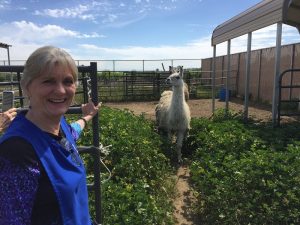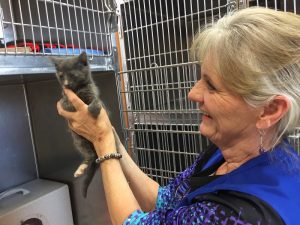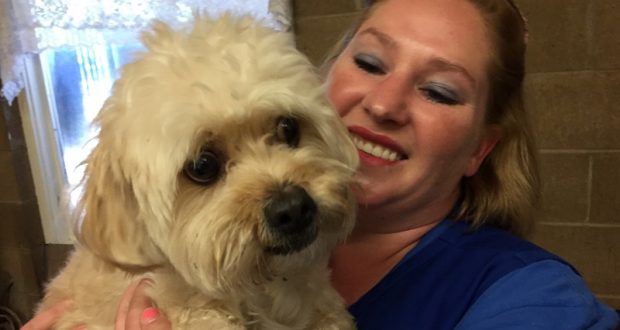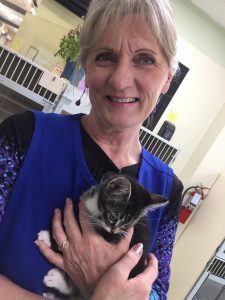MADERA – April is Prevention of Cruelty to Animals Month and the two-legged folks at the Madera Animal Shelter are saving the lives of more four-legged creatures than at any other time in the organization’s 50-year history.
Innovative new programs supported by a large volunteer base have helped the shelter to make dramatic improvements in its “live release” rates in recent years, according to the shelter’s director.
“We’re only having to euthanize animals that are very ill or have unmanageable behavior issues,” says Kirsten Gross, the shelter’s director. “We spend most of our resources fixing all of the broken critters that come our way. And we’ve developed very active programs to transport animals to areas where they have a much higher chance of being adopted.”
The shelter’s recent turnaround is remarkable.
In 2010, more than 70 percent — 5,406 — of the animals the facility took in had to be euthanized.
In 2018, the shelter’s euthanasia rate dropped below 15 percent, to just 878 animals.
“We’ve developed very active social media and online adoption campaigns and are also taking more and more animals to areas where they have a much higher chance of being adopted,” says Gross.
In just the past 8 months, volunteers at the shelter have transported more than 800 dogs and 700 cats to shelters and pet stores in Northern California and adoption centers in Oregon and Washington.
 Adoptions facilitated through the shelter’s retail sales partners like Petsmart and Petco have generated more than $400,000 in revenue for the organization. “We’ve been working with the Humane Society of Silicon Valley and the Oregon Human Society too,” Gross says.
Adoptions facilitated through the shelter’s retail sales partners like Petsmart and Petco have generated more than $400,000 in revenue for the organization. “We’ve been working with the Humane Society of Silicon Valley and the Oregon Human Society too,” Gross says.
“A lot of local businesses support the work we’re doing too,” she adds. The shelter, located next to the county jail, is a patchwork of small buildings, including a portable structure donated recently by Harris Construction.
Gross credits some of the shelter’s recent success to aggressive spay/neuter programs. She also praises the “thriving” partnership with Friends of Madera Animal Shelter (FMAS), a nonprofit group established by shelter supporters in 2002.
Since its founding, FMAS has raised more than $5 million to bolster operations at the shelter.
“Without the help of the Friends,” Gross says, “we’d still be putting down hundreds of animals a week.”
“Ninety-eight cents of every dollar we’ve raised goes back towards taking care of the animals,” says Kay Rhoads, FMAS treasurer. “We spend very little in administrative expenses.” (Rhoads’ daughter Velvet is the president of FMAS. Velvet currently fosters 16 dogs while her mother takes care of 11 others.)
Kirsten Gross has run the Madera Animal Shelter for 18 years. She manages a $1.3 million operating budget, a staff of 14 full-time employees and a rotating crew of community service and welfare-to-work volunteers.
Gross calls the many contributions to the shelter from FMAS “priceless.”
“They really help make this all work,” she says. “We’ve got a very active volunteer base. We couldn’t get any of this done without them.”
In 2013, shelter operations got a huge boost when the Red and Nancy Arnold Foundation donated $1.5 million to fund a free spay and neuter program for county residents.
Even the Madera County Grand Jury took note of the recent improvements at the shelter. In 2016, the Grand Jury investigated the shelter, and in particular, its euthanasia procedures. Their final report detailed intake, processing, adoption and euthanasia policies and commended the facility for its “humane” treatment of the thousands of animals it handles each year.
Gross says that in 2018, the shelter’s team of animal control officers responded to 3,500 service requests. “We’ve got four field officers and they have to cover about 2,000 square miles. So calls that come in to our dispatcher have to be prioritized,” Gross says. “Injuries come first. If it’s an urgent call and one of our officers is in the area, we can respond almost immediately.”
“By law, we have to take in any animals brought to the shelter,” she adds.
 The past week, the facility was housing a donkey and llama and, in recent months, has also hosted goats, turtles, pigs, doves, owls and hamsters.
The past week, the facility was housing a donkey and llama and, in recent months, has also hosted goats, turtles, pigs, doves, owls and hamsters.
The shelter does not have a veterinarian on staff, Gross says, so the facility must contract with local vets to provide exams and treatment for injured or sick animals.
Gross hopes to establish a memorandum of understanding (MOU) with the Eastern Madera County SPCA (EMC SPCA), which plans to open a new “no kill” shelter in Ahwahnee later this year.
“We are required to hold each animal we take in for at least three days,” Gross said. “We’re trying to coordinate with the [EMC SPCA] so that after their new shelter opens, they’ll be able to temporarily hold animals that our field officers rescue in the mountain area. That way, we won’t have to bring the animals down here right away.”
Deborah LeMarr Hall, a Coarsegold resident who sits on the FMAS board and also does volunteer work for the EMC SPCA, says she believes the two organizations can “work together very effectively. There is a vital need for both facilities in Madera County,” she says.
Gross says a new Madera Animal Shelter facility is in the planning stage. “We’re hoping to open it in four or five years,” she says. “But we still need to secure about $20 million in funding.”
Robin Bell, FMAS shelter programs coordinator, has been working recently to improve the shelter’s data collection system. “The system is crucial as our data is the only real tool to let us know how we’re doing,” Bell says.
In making the necessary fixes to better track numbers and outcomes, Bell discovered the shelter “wasn’t doing as well with cats as we were with dogs.”
 “We are euthanizing too many sick kittens in kitten season, which starts in early April and lasts till October, sometimes longer,” Bell says. “Last year we still had a few kittens in December.”
“We are euthanizing too many sick kittens in kitten season, which starts in early April and lasts till October, sometimes longer,” Bell says. “Last year we still had a few kittens in December.”
“When we realized we had a issue,” Bell adds, “Tamara Shimizu (another FMAS board member known as the ‘kitten guru’) and I reached out to Dr. Christie Kamiya,” the director of veterinary medicine at Humane Society of Silicon Valley.
“Dr. Kamiya was kind enough to spend a day mentoring us on kitten and cat shelter health,” Bell says.
Dr. Kamiya also shared the Madera Animal Shelter’s story with the organizers of the Million Cat Challenge.
“We ended up receiving a grant for a shelter consult valued at over $30,000,” Bell says.
The Million Cat Challenge grant also brought seven shelter veterinarians plus two shelter experts to Madera County Animal Services for three days earlier this month.
Both Gross and Bell believe the Madera Animal Shelter’s best days are yet to come.
“We’re working to become an even better resource for county animals and their owners,” Bell says. “Exciting things are in store for Madera County animals.”





